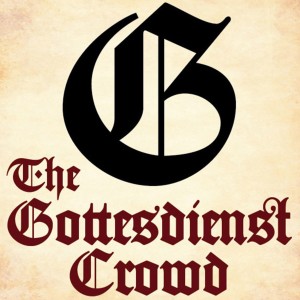Episodes

Monday May 02, 2022
TGC 190 — Thinking Out Loud (Easter 4)
Monday May 02, 2022
Monday May 02, 2022
Two pastors thinking out loud about the upcoming Gospel reading. This episode is devoted to the Gospel reading for The Fourth Sunday of Easter, John 16:16–22.
Read the rest of this entry »
Wednesday Apr 27, 2022
TGC 189 — Our Arrested Development
Wednesday Apr 27, 2022
Wednesday Apr 27, 2022
In our conversation “Have We Won the Battle for the Bible?” Adam Koontz mentioned that our age suffers from mass juvenility. In this episode, Adam takes us through where this is manifested. He differentiates juvenility from immaturity. And then gives us some practical steps to counteract the juvenility and even grow in maturity.
Read the rest of this entry »
Monday Apr 25, 2022
TGC 188 — Thinking Out Loud (Easter 3)
Monday Apr 25, 2022
Monday Apr 25, 2022
Two pastors thinking out loud about the upcoming Gospel reading. This episode is devoted to the Gospel reading for The Third Sunday of Easter, John 10:11–16.
Read the rest of this entry »
Wednesday Apr 20, 2022
TGC 187 — On Imprecation
Wednesday Apr 20, 2022
Wednesday Apr 20, 2022
They’re not in our hymnals. But they’re in the Bible. And so they should be in our hymnals. Thus, a great treasure has been stolen from Christians to learn how to pray in the way of the Imprecatory Psalms. We’re trying to fix that. In this episode, Ramirez leads us through what imprecation is. Then he demonstrates from the psalms and examples in the Bible, where the saints of old imprecate God’s enemies, and so their enemies also, so that we can follow in their train.
Host: Fr. Jason Braaten
Special Guest: Fr. David Ramirez
Read the rest of this entry »
Monday Apr 18, 2022
TGC 186 — Thinking Out Loud (Easter 2)
Monday Apr 18, 2022
Monday Apr 18, 2022
Two pastors thinking out loud about the upcoming Gospel reading. This episode is devoted to the Gospel reading for The Second Sunday of Easter, John 20:19–31.
Read the rest of this entry »![[Gottesblog] A Laboratory of Worst Practices — Larry Beane](https://pbcdn1.podbean.com/imglogo/image-logo/332069/G_logo_1500_f5mj7a_300x300.jpg)
Monday Apr 18, 2022
[Gottesblog] A Laboratory of Worst Practices — Larry Beane
Monday Apr 18, 2022
Monday Apr 18, 2022
Read the post at Gottesdienst.org.

Wednesday Apr 13, 2022
TGC 185 — In Memoriam + Rev. Fr. Stephen Wiest
Wednesday Apr 13, 2022
Wednesday Apr 13, 2022
If you hang around the Editors of Gottesdienst for long enough, you’ll no doubt end up hearing about Wiest, Rev. Dr. Stephen Wiest. I never personally knew or met this man, but from the stories, I want to. In this episode, we look at the man, the myth, the legend, to understand his contribution to confessional and liturgical Lutheranism and the Editors of our beloved journal.
Host: Fr. Jason Braaten
Regular Guest: Fr. Karl Fabrizius
Read the rest of this entry »
Monday Apr 11, 2022
TGC 184 — Thinking Out Loud (Easter Sunday)
Monday Apr 11, 2022
Monday Apr 11, 2022
Two pastors thinking out loud about the upcoming Gospel reading. This episode is devoted to the Gospel reading for The Resurrection of Our Lord, Mark 16:1–8.
Read the rest of this entry »
Wednesday Apr 06, 2022
TGC 183 — The God’s of Our Age (War)
Wednesday Apr 06, 2022
Wednesday Apr 06, 2022
In the first episode of The Gods of Our Age, Mark Preus walked us through an introduction. That the people of Rome, Galatia, Corinth, and Ephesus could hardly not know that they were idolaters when Paul preached to them. They had idols of stone and wood and precious metals. They had temples with statues devoted to their gods. We know from Luther’s Catechisms that an idol is anything that you fear, love, and trust in above all things. We have idols too. They are not statues of stone or wood or precious metals. But they look exactly like the idols of the ancient world.
In this episode, He narrows our focus on the God of War, Ares/Mars.
Host: Fr. Jason Braaten
Special Guest: Fr. Mark Preus
Read the rest of this entry »
Tuesday Apr 05, 2022
TGC 182 — Thinking Out Loud (Palm/Passion Sunday)
Tuesday Apr 05, 2022
Tuesday Apr 05, 2022
Two pastors thinking out loud about the upcoming Gospel reading. This episode is devoted to the Gospel reading for The Sixth Sunday in Lent, Palm/Passion Sunday, Matthew 26–27.
Read the rest of this entry »
